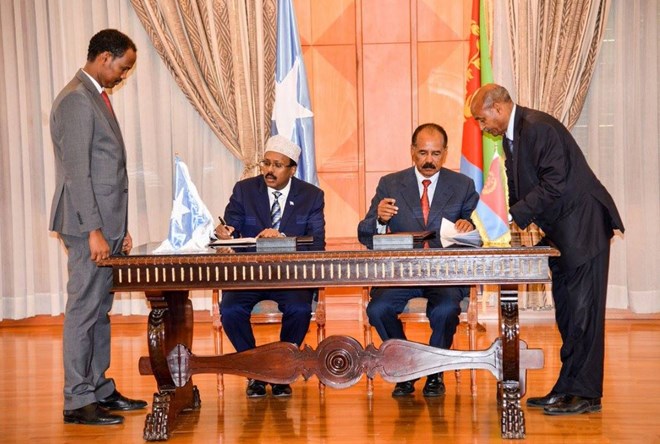After mending ties with Eritrea, Somalia calls for lifting of arms embargo on Asmara
The Somali call is sure to lend new impetus to Eritrea’s efforts to get the UN embargo — imposed in 2009 for its alleged involvement in Somalia — lifted.
By The Star Staff Writer
MOGADISHU – After mending ties with its former arch-foe Eritrea, the Somali government has called on the international community to fully lift an arms embargo and economic restrictions on Asmara to boost regional efforts toward economic integration.
President Mohamed Abdullahi Mohamed Farmajo made the call during the gala dinner Eritrean President Isaias Afwerki hosted in his honor on Saturday night in Asmara. Farmajo’s visit is aimed at restoring ties with the Red sea nation that in the past Mogadishu accused of supporting the Qaida-linked militants of al Shabab that is trying to topple it.
In 2009, the UN Security Council imposed an arms embargo on Asmara as well as travel ban and asset freeze on its political and military leaders for providing support to “armed groups undermining peace and reconciliation in Somalia” and for its refusal to withdraw its forces after clashes with Djibouti in June 2008. Eritrea denied the accusations, saying its then archrival Ethiopia was behind the efforts to isolate it.
“…We call for the complete lifting of (the arms) embargo and other economic restrictions on Eritrea to realize regional economic integration and reach agreements that make possible free trade that will facilitate the movement of people and goods,” said President Farmajo
The Somali call is sure to lend new impetus to Eritrea’s efforts to get the UN embargo lifted.
“Eritrea is crucial for the future of the Horn of Africa,” said President Farmajo in a Somali-language statement released on Sunday. “My administration is ready to work with your administration on the interest of our people and in general of those of the Horn of Africa” region.
In a recent visit to the Ethiopian capital, Addis Ababa, the U.N. secretary-general, Antonio Guterres, hinted that the sanctions could be “obsolete” in light of the improving relationship between Asmara and Addis Ababa.
The UN’s monitoring team on Somalia and Eritrea said last year that it didn’t find any conclusive evidence that Eritrea had provided support to the Qaida-linked militants of al Shabab for its fourth consecutive mandate.
Farmajo’s visit comes just weeks after Ethiopia and Eritrea reconciled following two decades of hostility and bloody wars that in 1998-2000 killed around 80, 000 people from both sides.
Ethiopia has last month announced its intention to cede Badame town, which was at the center of the conflict between the two neighboring nations, to Eritrea that claimed the town’s ownership. A UN court awarded Badame to Eritrea, a decision Addis Ababa’s previous administrations declined to abide by.
President Farmajo welcomed the rapprochement between Eritrea and Ethiopia.
“It’s certain that the whole of Horn of Africa will benefit from this new dawn marked by peace, friendship and regional cooperation,” Farmajo said, noting that Somalia and Eritrea agreed to re-open their embassies in each other’s capital and allow the free movement of people and goods between the two countries.
President Farmajo said he and Afwerki acknowledged that their “future is intertwined because we’re brothers of the same region.”
“We also agreed to strengthen our security, economic and regional development cooperation,” said President Farmajo.
In his speech during the dinner, Eritrean President Isaias Afwerki didn’t mention the sanctions on his country. Instead, he blasted “powerful countries” that use terrorism, piracy and the illegal trade of weapons and narcotics as justifications to further their “interventionist and expansionist agendas” in the Horn of Africa region.
“We have learned a lot from the obstacles that were woven in the past decades after the end of the Cold War, as we all embarked – i.e. Somalia, Ethiopia, Eritrea and the Sudan – in earnestness on the path of nation building,” President Afwerki said, according to the full text of the speech posted on the website of the Eritrean Ministry of Information.
The two leaders discussed how to strengthen ties between their nations to build a “bright future together,” said President Farmajo.
“I am confident that this historic visit will result in development and prosperity that will be beneficial for our two nations,” said President Farmajo.

